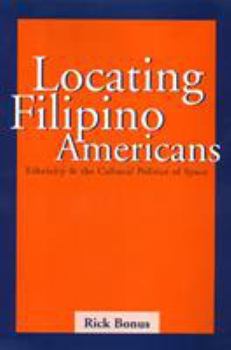Locating Filipino Americans: Ethnicity and the Cultural Politics of Space
Select Format
Select Condition 
Book Overview
The Filipino American population in the U.S. is expected to reach more than two million by the next century. Yet many Filipino Americans contend that years of formal and covert exclusion from mainstream political, social, and economic institutions on the basis of their race have perpetuated racist stereotypes about them, ignored their colonial and immigration history, and prevented them from becoming fully recognized citizens of the nation. Locating...
Format:Paperback
Language:English
ISBN:1566397790
ISBN13:9781566397797
Release Date:August 2000
Publisher:Temple University Press
Length:217 Pages
Weight:0.70 lbs.
Dimensions:0.7" x 6.0" x 9.0"
Customer Reviews
2 ratings
Power in Everyday Life
Published by Thriftbooks.com User , 23 years ago
This review was published in the fall 2001 issue of _The Pacific Reader: An Asian Pacific North American Review of Books_.Why do I feel such a deep sense of comfort when I am rummaging through dried fish, canned sardines and Spam at one of the many corner groceries along Jackson Street and Beacon Hill? What social function could "Filipino Time" (i.e., being perpetually late for meetings) serve for Filipino Americans? Or why is it that many times community meetings proceed like chaotic and politically-heated yelling matches?Perhaps one of the more auspicious experiences of a reader is the time when something, whether a written or visual work, empowers one to see the everyday world freshly and with new eyes. Moreover, for someone like myself, who was a student of Asian American Studies, it is additionally gratifying to witness a new generation of Filipino American scholars making significant contributions to academia in such an original manner. Rick Bonus is currently an assistant professor of American Ethnic Studies at the University of Washington, and he obtained his Ph.D. in Communications at the University of California, San Diego. His first book, Locating Filipino Americans: Ethnicity & the Cultural Politics of Space, is a highly accessible ethnographic study that analyzes the seemingly mundane worlds of Filipino "Oriental" stores and strip malls, community newspapers and beauty pageants in Southern California, and uncovers a powerfully rich and complex network of community building and resistance to racialization by Filipino American women and men. Central to Bonus' argument is that although Filipino Americans are the second largest Asian American group in the nation, and the largest in California, there is a common complaint that they are mostly invisible from mainstream history, scholarship, media and positions of power. This systematic form of exclusion on the basis of race and ethnicity has encouraged Filipino Americans "to respond to and resist invisibility, exploitation, silencing, and racial constructing, by history and by institutions, as well as a desire to claim a `space' within the rubric `American' on their own terms." His analysis of these "spaces" in stores, community centers, newspapers and pageants shows Filipino Americans attempting to construct an identity that is both Filipino and American while interrogating it at the same time. This dynamic of resistance and interrogation is something that has historical roots in the Philippines' colonial history and a people's cultural attempts to flourish and define themselves despite oppression, categorization, and tremendous regional diversity. Bonus argues that these particular cultural practices directly challenge these forms of exclusion and invisibility while also reflecting an effort to claim a self-determined space in America. In his study of these commercial establishments, Bonus combines oral interviews, multi-disciplinary theories, history and ethnographic fiel
Power in Everyday Life
Published by Thriftbooks.com User , 23 years ago
This review was published in the fall 2001 issue of _The Pacific Reader: An Asian Pacific North American Review of Books(..) Central to Bonus’ argument is that although Filipino Americans are the second largest Asian American group in the nation, and the largest in California, there is a common complaint that they are mostly invisible from mainstream history, scholarship, media and positions of power. (...)





